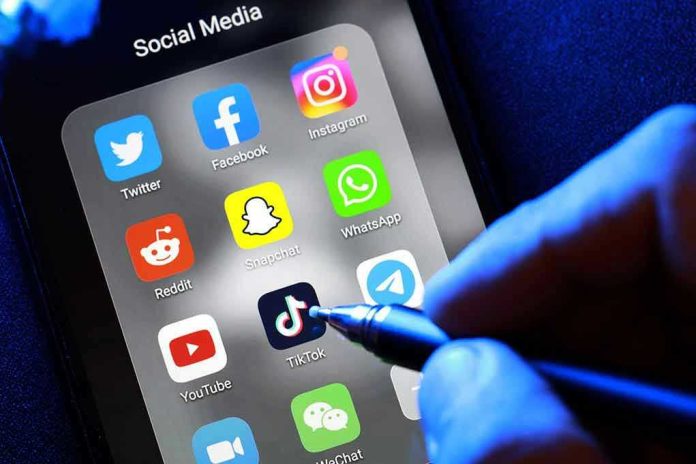
Mississippi just made it harder for kids to get on social media—unless mom and dad sign off—and now Big Tech is begging the Supreme Court to bail them out before this trend sweeps the nation.
At a Glance
- Mississippi’s new law requires parental consent and age verification for minors on social media.
- Tech industry group NetChoice is challenging the law, claiming it violates free speech and privacy.
- The law was triggered by a tragic sextortion case involving a Mississippi teen.
- The Supreme Court will decide whether the law remains in force as similar measures spread nationwide.
Big Tech Scrambles as Mississippi Demands Parents Take Charge
Mississippi has put its foot down, passing the Walker Montgomery Protecting Children Online Act in 2024, which now demands that every minor’s access to social media platforms be subject to parental permission and strict age verification. This move wasn’t just another government overreach—state lawmakers acted after a horrifying Instagram sextortion scheme led a Mississippi teen to take his own life. The legislature didn’t hesitate, unanimously approving the bill and sending it to Governor Tate Reeves, who signed it into law. Now, every tech giant—Facebook, Instagram, Snapchat, X, Reddit, and YouTube included—must comply or face the consequences. Predictably, Silicon Valley’s trade group NetChoice is fighting tooth and nail in court, insisting the law tramples on the First Amendment and privacy rights. Meanwhile, parents in Mississippi are waking up to the fact that someone finally decided to put their kids’ safety ahead of Silicon Valley’s bottom line.
🚨🇺🇸 𝗧𝗿𝗮𝗱𝗲 𝗚𝗿𝗼𝘂𝗽 𝗨𝗿𝗴𝗲𝘀 𝗦𝘂𝗽𝗿𝗲𝗺𝗲 𝗖𝗼𝘂𝗿𝘁 𝘁𝗼 𝗕𝗹𝗼𝗰𝗸 𝗦𝘁𝗮𝘁𝗲 𝗟𝗮𝘄 𝗥𝗲𝘀𝘁𝗿𝗶𝗰𝘁𝗶𝗻𝗴 𝗠𝗶𝗻𝗼𝗿𝘀’ 𝗔𝗰𝗰𝗲𝘀𝘀 𝘁𝗼 𝗦𝗼𝗰𝗶𝗮𝗹 𝗠𝗲𝗱𝗶𝗮
Read More 👇https://t.co/S2jmmoEi7i
— The Epoch Times (@EpochTimes) July 27, 2025
While the law is being hailed by many as a common-sense step, NetChoice is running straight to the Supreme Court, asking for an emergency order to stop the law before it gains traction across the country. The 5th Circuit Court of Appeals has already given the green light for Mississippi to start enforcing the rules, but Big Tech isn’t giving up, arguing that the law will burden platforms with massive compliance costs and put kids’ privacy at even greater risk. With the law in effect, tech companies are scrambling to figure out how to verify ages and get those parental permission slips—no more free passes for anonymous minors. The Supreme Court’s next move could set the stage for a nationwide showdown over who controls what kids see online, and whether states have the right to demand something as basic as parental involvement in children’s digital lives.
Mississippi’s Law Puts Parents Back in the Driver’s Seat
Attorney General Lynn Fitch has made it crystal clear: this law is about putting “modest duties” on social media platforms to keep predators away from children. For too long, parents have been sidelined while tech companies chase profits and politicians in Washington wring their hands but do nothing. Mississippi’s response—requiring real age verification and parental sign-off—finally gives parents a tool to protect their families. The law’s not just about safety; it’s about restoring parental authority that has been eroded by years of woke policies, big tech lobbying, and federal inaction. But of course, the tech lobby claims the law is “unconstitutional,” whining that it will cost too much and could even override parental authority. Only in today’s upside-down world would a rule that puts parents and kids first be considered controversial.
Social media giants, now facing real accountability, are scrambling to adapt. Some companies warn compliance could be “prohibitively expensive,” but maybe they should have worried about that before pushing platforms that expose kids to predators and bullies. The law’s immediate effect is clear: minors in Mississippi will only access social media if their parents say yes. For many families, that’s a welcome change. For tech companies, it’s a wake-up call that their free ride is over.
National Implications and the Looming Supreme Court Decision
What happens in Mississippi won’t stay in Mississippi. This law is already inspiring copycat bills in other states, triggering a national debate over how much control parents and states should have in the digital age. Legal scholars are split, with some warning of First Amendment challenges and others pointing to the urgent need for real action after high-profile tragedies. Parents, meanwhile, are tired of being told that “nothing can be done” while their children are targeted online. The Supreme Court now holds the cards—if they let the law stand, expect a tidal wave of similar legislation. If they side with Big Tech, it’s more business as usual, more excuses, and more kids paying the price for corporate profits and government inaction.
This legal battle isn’t just about one state—it’s about whether Americans will finally regain control over what happens to their children online, or if unelected tech executives and activist judges will keep undermining parental authority. With President Trump back in office and the Biden-era chaos fading, Mississippi’s fight could be the turning point in a much bigger war for the soul of the country’s families and the rights of parents to protect their kids from the digital wild west.
Sources:
Mississippi Today: Social media age verification law
SCOTUSblog: Group challenges restrictions on children’s access to social media
MPB Online: Mississippi’s social media age verification law challenged at US Supreme Court




